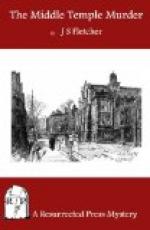The folk who expected something immediately sensational in Mr. Aylmore’s evidence were disappointed. Aylmore, having been sworn, and asked a question or two by the Coroner, requested permission to tell, in his own way, what he knew of the dead man and of this sad affair; and having received that permission, he went on in a calm, unimpassioned manner to repeat precisely what he had told Spargo. It sounded a very plain, ordinary story. He had known Marbury many years ago. He had lost sight of him for—oh, quite twenty years. He had met him accidentally in one of the vestibules of the House of Commons on the evening preceding the murder. Marbury had asked his advice. Having no particular duty, and willing to do an old acquaintance a good turn, he had gone back to the Anglo-Orient Hotel with Marbury, had remained awhile with him in his room, examining his Australian diamonds, and had afterwards gone out with him. He had given him the advice he wanted; they had strolled across Waterloo Bridge; shortly afterwards they had parted. That was all he knew.
The court, the public, Spargo, everybody there, knew all this already. It had been in print, under a big headline, in the Watchman. Aylmore had now told it again; having told it, he seemed to consider that his next step was to leave the box and the court, and after a perfunctory question or two from the Coroner and the foreman of the jury he made a motion as if to step down. But Spargo, who had been aware since the beginning of the enquiry of the presence of a certain eminent counsel who represented the Treasury, cocked his eye in that gentleman’s direction, and was not surprised to see him rise in his well-known, apparently indifferent fashion, fix his monocle in his right eye, and glance at the tall figure in the witness-box.
“The fun is going to begin,” muttered Spargo.
The Treasury representative looked from Aylmore to the Coroner and made a jerky bow; from the Coroner to Aylmore and straightened himself. He looked like a man who is going to ask indifferent questions about the state of the weather, or how Smith’s wife was last time you heard of her, or if stocks are likely to rise or fall. But Spargo had heard this man before, and he knew many signs of his in voice and manner and glance.
“I want to ask you a few questions, Mr. Aylmore, about your acquaintanceship with the dead man. It was an acquaintanceship of some time ago?” began the suave, seemingly careless voice.
“A considerable time ago,” answered Aylmore.
“How long—roughly speaking?”
“I should say from twenty to twenty-two or three years.”
“Never saw him during that time until you met accidentally in the way you have described to us?”
“Never.”
“Ever heard from him?”
“No.”
“Ever heard of him?”
“No.”
“But when you met, you knew each other at once?”




